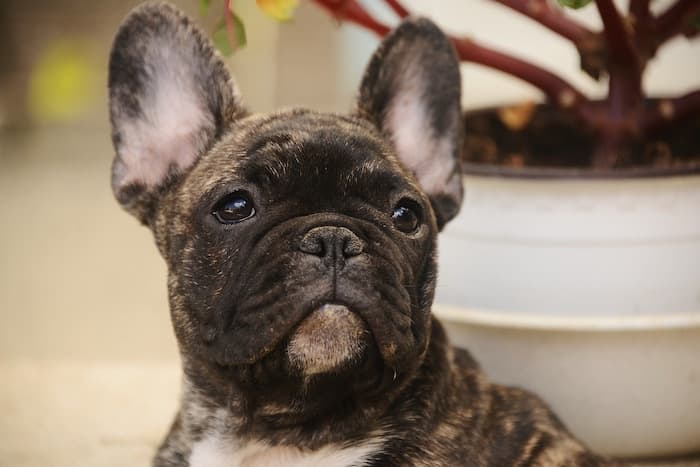French bulldogs have steadily grown in popularity among all kinds of pet parents over recent years. Their small and easy-to-manage size makes them a great choice for people living in apartments or those that just want an indoor pet. You can easily tell a French bulldog from a distance due to its size and its disproportionately large, bat-like ears. For many pet parents, the main reason for getting a Frenchie is the size and the overall look of the breed.
The French bulldog has its roots in the English bulldog and the French terrier and gets many traits from its ancestors in terms of both temperament and physical features. Choosing a breed for your next pet can be a difficult choice even for experienced pet parents. Here are a few things about French bulldogs that you should know before choosing one as your next pet.
1. Emotional
As is the case with most lapdogs, French bulldogs can be quite emotional. Even though they are not rated as being the most intelligent dog breed, they still have very high emotional intelligence. They pick up on emotions very quickly, and they themselves also feel emotions quite intensely. French bulldogs are known to cry and mope if they are yelled at or even just told off for doing silly things like biting into furniture.
If you travel a lot or can’t give your Frenchie enough time, then this will not be the best choice of pet, since these animals get emotionally attached to their owners, and they need attention on a daily basis. They can suffer from depression and separation anxiety quite severely, so make sure you can handle the emotional needs of a Frenchie before getting involved.
2. Shedding
Even though French Bulldogs have a rather short coat, much like an English bulldog, they tend to shed a lot more than other dogs of their size. In fact, the Bolognese, which has a lot more hair, sheds a lot less than the French bulldog. According to https://ohmybullys.com, you should go for a hypoallergenic breed of dog if you don’t like the shedding, you are allergic to dog hair, or you just don’t want to have a big mess to clean every time you and your pet get off the couch. Since French bulldogs love to snuggle up in your lap and get comfortable in tight, warm places, for instance, the corner of a couch, it can be quite a lot of cleaning for the pet owner.
3. Great For Training
French bulldogs are not known for being the most intelligent pets, but that doesn’t stop them from being trainable. While you won’t be winning any agility or training competitions with a French bulldog, you can still certainly train these pets to a high degree and make them more manageable at home. One of the biggest challenges for new pet owners is actually getting their dog to follow orders. French bulldogs love their parents, and they love to please, so they are willing to go to great lengths to learn what they are being taught and follow suit. If you want an easy-to-handle dog that can be easily trained for basic things, then this is a great breed to get.
4. Water
Contrary to popular belief, a lot of small dogs have trouble with water and especially swimming – French bulldogs included. If you have a pool at home or just enjoy being near large bodies of water with your dog, then the French bulldog might not be for you. If a Frenchie falls into a pool of water, they can’t do anything to save themselves from drowning. The fact that they have small legs and heavy upper bodies makes it impossible for them to balance their weight in water.
5. They Can’t Breed
A lot of people like to get a pair of dogs, so they can start their own family, but unfortunately, this won’t be possible with French bulldogs. These animals were bred specifically to be lapdogs, and in doing so their physical structure doesn’t allow for natural breeding. Instead, they have to be artificially inseminated, and they give birth through a C-section surgery. If you don’t mind going through this process with your pet then it is fine, but if you want to have dogs that can breed naturally then this isn’t the breed for you.
6. Health Problems
Small dogs are known for their health problems and Frenchies, being descendants of bulldogs, have plenty. The most common are related to their breathing and their chewing. The excessive skin on their faces can make it hard to breathe and eat in old age. Their joints, especially the rear legs, can also face problems with age. Eyesight is also a challenge in some dogs and generally, they require a lot more maintenance as they get older. As they get older, they will also start to drool a lot more, shed a lot more, and digestive issues also start to increase. If you enjoy taking care of your pet then that’s great, but if you are looking for a low-maintenance dog then Frenchies are not the right choice.
7. Bite Force
These little animals do pack a punch when it comes to bite force. Considering that they are derived from bulldogs, it should come as no surprise. Even though the French bulldog’s jaw is much smaller and the teeth are also much smaller, it is still a powerful bite. If you are getting toys for your French bulldog, make sure you get some high-strength versions. Also, make sure you train your dog early on if you don’t want them chewing through furniture, books, and even electronics. They are naturally very inquisitive dogs, and biting through things is a way for them to learn about their surroundings.
French bulldogs can easily live for 10 to 12 years and throughout this age, they will be active, playful, and affectionate. However, they do require a bit more care in later years. If you are willing to invest the time for this dog, then they will be a great choice. They are an excellent addition to a family environment as they get along with people of all ages, and they have the energy level needed to keep up with playful little children.
Related Reading



